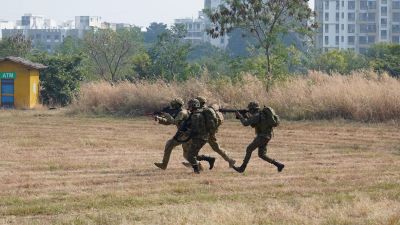Kaun Banayega Rashtrapati
People want a noble president. Politicians want an obedient one. History is on politicians’ side

The civil servant, C.S. Venkatachar, who was secretary to the first president of India, Rajendra Prasad, once told me this very revealing story. When the prime minister, Jawaharlal Nehru, was in town, he would come to Rashtrapati Bhavan every Monday and spend an hour or so with the president. They would speak alone, without aides. As occupants respectively of the most important and highest post in the Government of India, and as old colleagues in the national movement, one would think that they had matters of import to talk about. After watching this weekly ritual for six months, Venkatachar mustered the courage to ask his boss what exactly it was that they discussed. Rajendra Prasad said in reply: “Panditji aate hain, idhar udhar ki baat karte hain, phir chalen jate hain.” In other words, they discussed weather, cricket, films, but nothing of consequence.
After Nehru and Prasad were dead and he himself was retired, Venkatachar published a long essay entitled, ‘Relations between the Indian President and the Prime Minister’ (India Quarterly, 1971). He wrote there of how Nehru kept the president at arm’s length and wanted no elder statesman to remind him of the truth of the advice which Lloyd George gave Winston Churchill during the latter’s prime ministership: “It is important for a prime minister to be surrounded by people who could stand up to him and say, not once but thrice, ‘No’.” As for Prasad, he was “content to be informed at the pleasure of the prime minister and not to be ‘consulted’ in constitutional matters; he faithfully performed whatever duties he was asked to do. He had his own ideas how he should ‘encourage’ and ‘warn’ the cabinet; even made a couple of futile attempts in that direction but chose to efface himself due to his innate shyness, modesty and lack of confidence in himself to confront Nehru.”
The “futile attempts” referred to were in the context of the debates over the Hindu Code Bill. Nehru and his law minister, B.R. Ambedkar, were determined to reform the personal laws of Hindus and bring them in line with modern notions of gender justice. Rajendra Prasad, on the other hand, felt that the elders of the Hindu community had not been consulted about the impending changes in the law. This difference of views led to a minor constitutional crisis, documented by Granville Austin in his magnificent book on the Indian Constitution. After Prasad suggested that he could withhold assent from bills that did not meet with his approval, Nehru consulted the legal experts Alladi Krishnaswamy Ayyar and M.C. Setalvad. Setalvad, who was then attorney general, wrote that “by Article 74(1) the president is required to act in all matters with the aid and advice of his Council of Ministers”. Ayyar, who had played a crucial role in drafting the Constitution, said that the president’s role was analogous to that of the British monarch, and “there is no sphere of his functions in respect of which he can act without reference to the advice of his ministers”. He ominously added that if Prasad’s interpretation of his own role was allowed to pass uncontested, it “would upset the whole constitutional structure… (and) make the president a kind of dictator”.
Nehru passed on the correspondence to Prasad, who now backed off. For the rest of his term (which extended, with a re-election, until 1962) he was content simply to sign on the dotted line. That the Ayyar-Setalvad interpretation of the president’s role was the correct one is confirmed by two remarks of Ambedkar quoted by A.G. Noorani in an essay published in the Indian Express forty years ago. Speaking in the Constituent Assembly on November 4, 1948, Ambedkar said that under the draft of the Constitution being prepared, the president “is the head of the state but not of the executive… (He) will be generally bound by the advice of his ministers. He can do nothing contrary to their advice nor can he do anything without their advice.” Seven weeks later, Ambedkar said that “there is no case which can arise where the president would be called upon to discharge his functions without the advice of the prime minister or his cabinet”. “Under a parliamentary system of government,” remarked the law minister, “there are only two prerogatives which the king or the head of the state may exercise. One is the appointment of the prime minister and the other is the dissolution of Parliament.”
So long as the Government of India was run by majority governments even these two decisions were not really prerogatives. The president merely had to invite the leader of the party with a majority to become prime minister; and, roughly five years later, to dissolve Parliament and call fresh elections when asked to do so by the prime minister. However, in this age of governments run by coalitions of a dozen and more parties, governments that can be made and unmade by the desertion of a few MPs, the president can sometimes play a more proactive role. This explains the professed concern of the Left parties to appoint a “political” person as our next head of state, as well as the unspoken desire of the Congress president to have a loyalist elected to the post.
Parties seem to think of the role of the president as something between a figurehead and a rubber stamp. Sections of the public and the media, however, wish for a president who shall be something between an elder statesman and a national conscience. Hence the rash of stories that have appeared recently about how the next president should be a non-political Indian of distinction such as Amartya Sen or N.R. Narayana Murthy.
In this case, precedent and constitutional authority appear to be on the side of the politicians. Whatever the wishes and desires of the English-speaking middle class, the president was not intended to be an omniscient oracle correcting and chastising greedy and corrupt netas. We can, however, still wish for a president who will more gracefully fill the ornamental role of the office. We cannot, in the present system, get a president who will over-rule his ministers; but give us at least a president who can dress well and have an elegantly worded speech for every occasion.
The writer, a historian, recently published ‘India after Gandhi: The History of the World’s Largest Democracy’





- 01
- 02
- 03
- 04
- 05


























